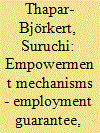| Srl | Item |
| 1 |
ID:
170268


|
|
|
|
|
| Summary/Abstract |
The Mahatma Gandhi National Rural Employment Guarantee Act (NREGA) in India opens a new chapter in rural governance, signifying transformative potential for enhancing economic and social security. One of the key objectives of the Act is to aid in the empowerment of marginalised communities, especially women, Scheduled Castes (SCs) and Scheduled Tribes (STs). However, no analytically rigorous attempt has been made to study the mechanisms and processes that are leading to empowerment or even the (unintended) processes of disempowerment. Our paper investigates (dis) empowerment as a process rather than as a (quantifiable) outcome and analyses the mechanisms through which the embedded gender and caste norms are being challenged (though not completely eroded), but also how powerful actors at household, community and market levels can come to resent processes that entail upward mobility of women and marginalised communities. We draw on a comparative study based on extensive qualitative indepth interviews and participant observation, in rural areas of two Indian states, Uttar Pradesh (North India) and Andhra Pradesh (South India). The former exhibits almost all the elements we associate with low development, whereas the latter belongs to a group of southern Indian states with higher levels of human and economic development.
|
|
|
|
|
|
|
|
|
|
|
|
|
|
|
|
| 2 |
ID:
129093


|
|
|
|
|
| Publication |
2014.
|
| Summary/Abstract |
Cast in the framework of social capital theory, this research used case studies to investigate the settlement experiences of African migrants in Armidale, Tamworth and Coffs Harbour in Australia. Analysis of individual (n = 29) and one focus group interview data revealed that most migrants expressed some satisfaction with service provision in the areas of initial settlement support and the work of local community organizations. Problems still remained with regard to employment, family reunion and dealing with changes in family relations. The study concludes that there is a need to educate African migrants on mainstream Australian culture in order to enhance the migrants' capacity to build social capital. Local governments need to make specific provisions within their policies, focusing on the settlement of migrants to address some of the gaps in services.
|
|
|
|
|
|
|
|
|
|
|
|
|
|
|
|